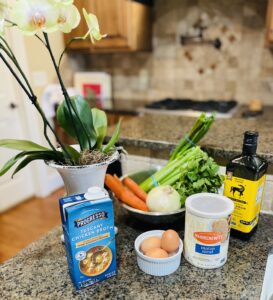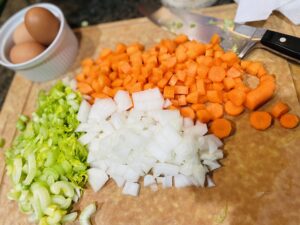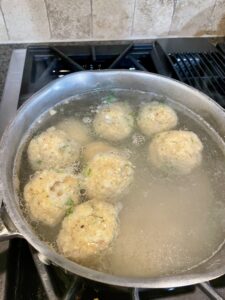Recipe
 Ingredients:
Ingredients:
4 large eggs
¼ cup olive oil
¼ cup chicken stock or vegetable stock
1 cup matzo meal
¼ teaspoon ground nutmeg
1 to 2 tbsp. freshly grated ginger
2 tbsp. finely chopped parsley, dill or cilantro
1 tsp. salt
Black pepper
Vegetables for soup
Instructions:
Combine your eggs, olive oil, stock, matzo meal, nutmeg, ginger, and parsley in a large bowl. Season with salt and pepper. Gently mix, cover, and refrigerate for at least three hours. 
Fill a deep pan with lightly salted water and bring to a boil. Shape mixture into balls with wet hands and put into the boiling water.

Cover pan and reduce heat to a simmer. Cook the matzo balls for around 30-40 minutes.
To make soup, sauteed carrots, garlic, onion, and celery in olive oil. Add into chicken broth.
Place your matzo balls into your soup and enjoy.
Family Significance:
Matzo ball soup has always been a dish that I knew as common. I grew up with it, as did the rest of my family. But when I compared chicken and dumplings to the soup and was met with confusion, I realized that it wasn’t as customary for people in the south. When you are sick, naturally you’re given soup. Matzo ball soup was one of my go-to’s. It is also a pretty flexible dish. I have made it vegetarian with vegetable broth as opposed to chicken broth, made the matzo balls lighter and denser, tried out new additions, etc. It is such a classic easy soup that you can’t really go wrong with it. It is arguably the most popular Jewish food for good reason.
Cultural Significance:
Matzo ball soup is an extremely popular staple in jewish culture. It is traditionally eaten on Passover, which is a holiday that celebrates the jews’ freeing from slavery in Egypt. Matzo is a representation of the aforementioned exodus from Egypt, because of its unleavened state. When fleeing Egypt, there was no time to let the bread rise, resulting in it being unleavened and therefore creating the matzo that we have today. Matzo and matzo ball soup are important parts of Jewish culture as they showcase an important moment in history for Jewish people and help to remind us of where we came from.

